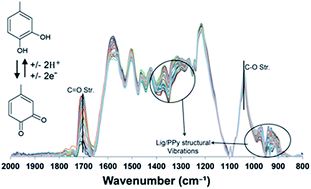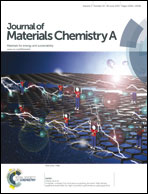Spectroelectrochemical investigation of redox states in a polypyrrole/lignin composite electrode material†
Abstract
We report spectroelectrochemical studies to investigate the charge storage mechanism of composite polypyrrole/lignin electrodes. Renewable bioorganic electrode materials were produced by electropolymerization of pyrrole in the presence of a water-soluble lignin derivative acting as a dopant. The resulting composite exhibited enhanced charge storage abilities due to a lignin-based faradaic process, which was expressed after repeated electrochemical redox of the material. The in situ FTIR spectroelectrochemistry results show the formation of quinone groups, and reversible oxidation–reduction of these groups during charge–discharge experiments in the electrode materials. The most significant IR bands include carbonyl absorption near 1705 cm−1, which is attributed to the creation of quinone moieties during oxidation, and absorption at 1045 cm−1 which is due to hydroquinone moieties.


 Please wait while we load your content...
Please wait while we load your content...